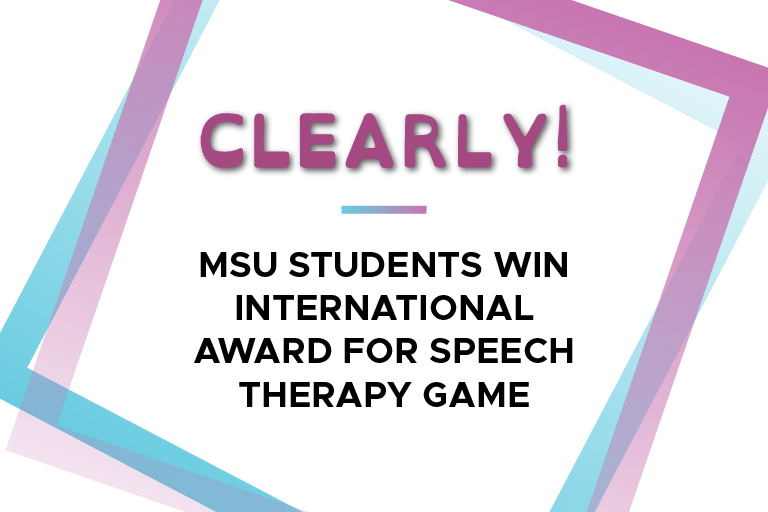Four MSU students recently earned international recognition for a speech therapy game they developed to help people with Parkinson’s Disease (PD) keep their voices strong.
Maura Philippone, Madeline Allen, Adam Elfawal and Jesse Sanderson were awarded a bronze medal at the International Serious Play Conference held in Toronto this August. The students are working towards completion of their Serious Games Graduate Certificate. Their game, called CLEARLY!, is designed to help people with PD bolster their ability to pronounce words and phrases with volume and clarity.
Philippone, a speech-language pathology Ph.D. student, initially developed the game.
“Parkinson's is a neurodegenerative condition, which means it gets worse over time,.” Philippone said. “People may start to speak (progressively) quieter over time or make smaller movements, and they don’t always realize it. So, in terms of therapy, a huge consideration is, how we can build that habit and that strength in a way that notifies them that they need to speak a little louder and a little more clearly?”
Philippone says current therapy routines for people with Parkinson’s tend to be somewhat regimented.
“While speech therapy often involves drill-based and regular exercises, particularly the standard treatments for people with Parkinson’s disease, it can be hard for some people to stay motivated to keep doing these exercises after the treatment course ends,”she said. She additionally noted that the reduced dopamine levels characteristic of PD may also contribute to reduced motivation to practice for some individuals.
Serious games, or games with purposes beyond pure entertainment, are one approach to enhancing skill practice and transfer to conversations with communication partners. In this way,CLEARLY! aims to make “clear and loud” speech practice a more enjoyable, interactive experience between a person with PD and a family member or caregiver.
“Basically, the person with PD will be shown a card with an illustration on it,” said Jesse Sanderson, who designed the card graphics. “There are 24 cards, divided into three different themed decks with eight cards each. The player will describe the image they see, clearly and loudly. The player uses a microphone, and there’s a volume output meter to indicate how loudly or softly they’re speaking.”
The ideal target is between 70 and 80 decibels. The player’s teammate listens to the speaker’s description. If they choose the correct picture, that team keeps the card. The team that collects the most cards wins. Sanderson says the design team would like to add the ability for players to upload their own cards to create their own personalized decks.
Philippone says the rules allow for the speaker to receive some help if necessary.
“We do build into the game some guidance for when to cue and how to cue,” she said. “That’s one of the driving factors behind this game: it creates a more ‘failure friendly’ environment. Designing an approach that takes a game-based angle can help (therapy) feel less like a critique.”
Parkinson’s Disease is linked to a drop in the level of dopamine, an organic chemical that serves as a neurotransmitter in the brain. Philippone says many subtypes fall under the Parkinson’s umbrella, with each accompanied by their own array of symptoms and support needs. As a speech-language pathologist, she’s driven to help people feel more understood.
“An interesting thing I find in Parkinson’s populations is that I hear them expressing things like, ‘people are hearing the sound of my voice, but they’re not listening to what I’m saying,’” Philippone said. “When you work with a patient on their exercises, and as they move through the process, you watch them gain their confidence. Ideally, they gain skills and demonstrate them with increasing independence. That’s one of the most fulfilling things (for me).”
By: Kevin Lavery
